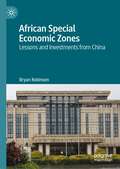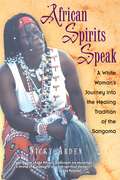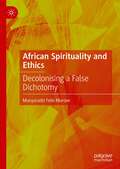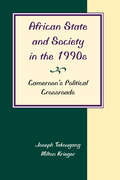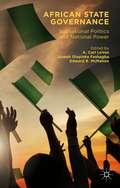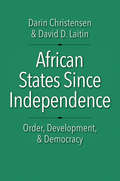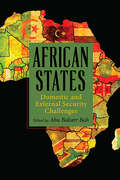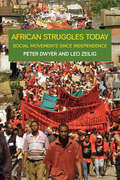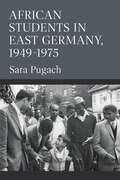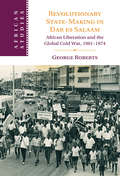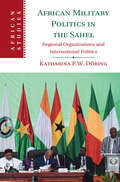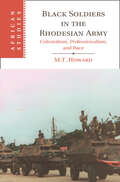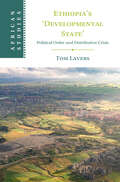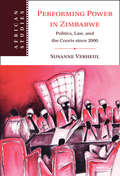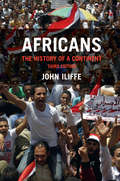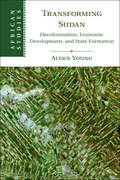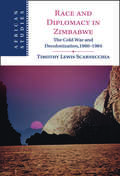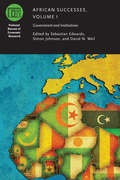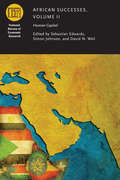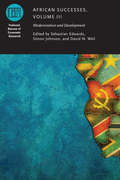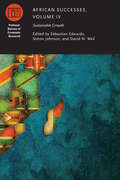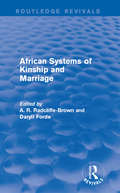- Table View
- List View
African Special Economic Zones: Lessons and Investments from China
by Bryan RobinsonThis book evaluates African Special Economic Zones from the perspective of learning from China’s experiences with such Zones and the impact of Chinese policy and investment on African Zones. Utilising case studies of perceived successful Special Economic Zones in China, the book proposes the Chinese Model of Special Economic Zones as an evaluation and benchmarking tool against which African Special Economic Zones are considered. Applying several case studies on African Special Economic Zones, the book then details the competitiveness of African Special Economic Zones with a specific focus on attracting Chinese investors to these Zones. The economic, social and environmental impact of these zones are appraised. African Nations’ efforts, or lack thereof, to enable successful Special Economic Zones are critically analysed. Finally, Special Economic Zones in Africa are compared against the Chinese Model; and an African Model of Special Economic Zones is proposed. Recommendations are presented to both African Nations’ leadership and Chinese policymakers and investors as to how these Zones can be improved to enhance competitiveness and the attainment of the Zones’ sustainable development objectives.
African Spirits Speak: A White Woman's Journey into the Healing Tradition of the Sangoma
by Nicky ArdenThe moving story of an expatriate coming to terms with her country's history, and her joyous spiritual and emotional rebirth as an African healer. • One of the first accounts of the mysterious sangomas, the healers of South Africa's black population. • A mystical journey that will appeal to those wishing to reunite with their roots and a more spiritual life.Set against the stirring backdrop of a crumbling apartheid regime, African Spirits Speak is the lyrical account of white South African Nicky Arden's journey into the world of the sangomas, the diviners, doctors, psychologists, and priests of South Africa's black population. While in her early twenties Nicky fled South Africa with her husband as the stranglehold of apartheid tightened on her native land. For twenty-two years they lived in California as expatriates--never once returning to their homeland--until a deep depression, followed by a spiritual awakening in the California desert, compelled Nicky to return to South Africa. During her visit, while exploring deep in the bush, she unexpectedly met an old black medicine woman--a sangoma. This meeting would change her life. Few white South Africans are even aware of the world of the sangomas, but this prophetic old woman saw in Nicky the spirit of a fellow healer and set the author on a mystical journey that would reunite her soul with its African roots. Thus began her astonishing and complex initiation into a nearly unknown world and her quest to discover the truth about herself and her heritage.
African Spirituality and Ethics: Decolonising a False Dichotomy
by Munyaradzi Felix MuroveThis book explores the symbiotic relationship that exists between African spirituality and ethics. Felix Murove discusses how these two concepts are entwined, and illustrates how they play a role in applied ethical issues. He argues that the general understanding of spirituality in Africa stems from Christianity, which has had a negative impact on African indigenous spirituality. The conceptual tools that run throughout the book are considerably Afro-centric, a methodological strategy which inevitably requires the reader to adopt some prior willingness to learn these Afro-centric concepts without easily resorting to western Christian and philosophical categories of thought. The book advocates for an Afro-centric conceptualization of spirituality and ethics, and encourages the reader to adopt a more holistic approach to African spirituality.
African State And Society In The 1990s: Cameroon's Political Crossroads
by Joseph TakougangAfrican State and Society in the 1990s is the first comprehensive English language book to appear on Cameroon's political events since 1989. Designed for academic and policy studies readers, it covers developments from the 1960s to the present as background for an analysis of the continuing conflict since 1990 between the regime and political oppos
African State Governance: Subnational Politics And National Power
by A. Carl LeVan Joseph Olayinka Fashagba Edward R. McMahonAfrica is changing and it is easy to overlook how decentralization, democratization, and new forms of illiberalism have transformed federalism, political parties, and local politics. Chapters on Kenya, Nigeria, Ethiopia, and South Africa help fill an important gap in comparative institutional research about state and local politics in Africa.
African States since Independence: Order, Development, and Democracy (Castle Lecture Series)
by Darin Christensen David D. LaitinAuthors Christensen and Laitin argue that an interplay of geographic, historical, and demographic factors undergird sub‑Saharan states’ post‑independence struggles to eradicate poverty, establish democratic accountability, and quell civil unrest. They set out the founding fathers’ challenges in transforming their postcolonial states, many of which are ethnically diverse, geographically diffuse, sparsely populated, and lacking in administrative capacity. With the legacies of the slave trade, partition, Christian missionaries, and extractive colonial institutions complicating their efforts, many African states faced stagnation, authoritarianism, and civil strife. Recent years have seen promising attempts to restore democracy to states under authoritarian rule and to liberalize their economies, suggesting that the region is moving toward a new era. Relying on the best statistical data and richly illustrated with case material, this book is an indispensable source for scholars and policy analysts seeking to understand Africa’s post‑independence political trajectories.
African States: Domestic and External Security Challenges (SUNY series, James N. Rosenau series in Global Politics)
by Abu Bakarr BahEssays on the security challenges faced by African states.The central concern that shapes this edited volume is the nature of the African state. Contributors point to an interesting intersection of domestic and external issues that is framed as a glocalized security situation. Individual chapters shed new insights on conflict drivers through case studies on Sierra Leone, Cameroon, Mali, Nigeria, and Somalia, as well as broader issues on the nature of African states. Arguments pivot on three issues, which show the intersection of the domestic and external forces that render the African state as a glocal problem: (a) the colonial roots of the state, (b) problems of governance, and (c) international and regional security imperatives. By problematizing the African state and connecting the security challenges of African states to colonialism, patrimonial rule, and geopolitical security issues, African States brings forth a new way of examining African states through the notion of glocalized security.
African Struggles Today
by Peter Dwyer Leo ZeiligThree leading Africa scholars investigate the social forces driving the democratic transformation of postcolonial states across southern Africa. Extensive research and interviews with civil society organizers in Zimbabwe, South Africa, Zambia, Malawi, Namibia, and Swaziland inform this analysis of the challenges faced by non-governmental organizations in relating both to the attendant inequality of globalization and to grassroots struggles for social justice.Peter Dwyer is a tutor in economics at Ruskin College in Oxford.Leo Zeilig Lecturer at the Institute of Commonwealth Studies, University of London.
African Students in East Germany, 1949-1975 (Social History, Popular Culture, And Politics In Germany)
by Sara PugachThis book explores the largely unexamined history of Africans who lived, studied, and worked in the German Democratic Republic. African students started coming to the East in 1951 as invited guests who were offered scholarships by the East German government to prepare them for primarily technical and scientific careers once they returned home to their own countries. Drawn from previously unexplored archives in Germany, Ghana, Kenya, Zambia, and the United Kingdom, African Students in East Germany, 1949–1975 uncovers individual stories and reconstructs the pathways that African students took in their journeys to the GDR and what happened once they got there. The book places these experiences within the larger context of German history, questioning how ideas of African racial difference that developed from the eighteenth through the early twentieth centuries impacted East German attitudes toward the students. The book additionally situates African experiences in the overlapping contexts of the Cold War and decolonization. During this time, nations across the Western and Soviet blocs were inviting Africans to attend universities and vocational schools as part of a drive to offer development aid to newly independent countries and encourage them to side with either the United States or Soviet Union in the Cold War. African leaders recognized their significance to both Soviet and American blocs, and played on the desire of each to bring newly independent nations into their folds. Students also recognized their importance to Cold War competition, and used it to make demands of the East German state. The book is thus located at the juncture of many different histories, including those of modern Germany, modern Africa, the Global Cold War, and decolonization.
African Studies Series: African Liberation and the Global Cold War, 1961–1974 (African Studies Book 156)
by George Roberts<p>Tracing Dar es Salaam's rise and fall as an epicentre of Third World revolution, George Roberts explores the connections between the global Cold War, African liberation struggles, and Tanzania's efforts to build a socialist state. Instead of understanding decolonisation through a national lens, he locates the intersection of these dynamics in a globally-connected city in East Africa. Revolutionary State-Making in Dar es Salaam introduces a vibrant cast of politicians, guerrilla leaders, diplomats, journalists, and intellectuals whose trajectories collided in the city. In its cosmopolitan and rumour-filled hotel bars, embassy receptions, and newspaper offices, they grappled with challenges of remaking a world after empire. Yet Dar es Salaam's role on the frontline of the African revolution and its provocative stance towards global geopolitics came at considerable cost. Roberts explains how Tanzania's strident anti-imperialism ultimately drove an authoritarian turn in its socialist project and tighter control over the city's public sphere.</p>
African Studies Series: Political Order And Distributive Crisis (African Studies #Series Number 168)
by Tom LaversAfrican Studies Series: Politics, Law, And The Courts Since 2000 (African Studies #Series Number 155)
by Susanne Verheul<p>Focusing on political trials in Zimbabwe's Magistrates' Courts between 2000 and 2012, Susanne Verheul explores why the judiciary have remained a central site of contestation in post-independence Zimbabwe. Drawing on rich court observations and in-depth interviews, this book foregrounds law's potential to reproduce or transform social and political power through the narrative, material, and sensory dimensions of courtroom performances. Instead of viewing appeals to law as acts of resistance by marginalised orders for inclusion in dominant modes of rule, Susanne Verheul argues that it was not recognition by but of this formal, rule-bound ordering, and the form of citizenship it stood for, that was at stake in performative legal engagements. In this manner, law was much more than a mere instrument. Law was a site in which competing conceptions of political authority were given expression, and in which people's understandings of themselves as citizens were formed and performed.</p>
African Studies Series: The History of a Continent (African Studies #137)
by John IliffeIn a vast and all-embracing study of Africa, from the origins of mankind to the AIDS epidemic, John Iliffe refocuses its history on the peopling of an environmentally hostile continent. Africans have been pioneers struggling against disease and nature, and their social, economic and political institutions have been designed to ensure their survival. In the context of medical progress and other twentieth-century innovations, however, the same institutions have bred the most rapid population growth the world has ever seen. Africans: The History of a Continent is thus a single story binding living Africans to their earliest human ancestors.
African Studies: Decolonization, Economic Development, and State Formation (African Studies #140)
by Alden YoungFollowing the conclusion of the Second World War, the nature of inequality in Africa was dramatically altered. In this book, Alden Young traces the emergence of economic developmentalism as the ideology of the Sudanese state in the decolonization era. Young demonstrates how the state was transformed, as a result of the international circulation of tools of economic management and the practice of economic diplomacy, from the management of a collection of distinct populations, to the management of a national economy based on individual equality. By studying the hope and eventual disillusionment this ideology gave to late colonial officials and then Sudanese politicians and policymakers, Young demonstrates its rise, and also its shortfalls as a political project in Sudan, particularly its inability to deal with questions of regional and racial equity, not only showing how it fostered state formation, but also civil war.
African Studies: Political Identity and Conflict in Central Angola, 1975–2002
by Justin PearceThis book examines the internal politics of the war that divided Angola for more than a quarter-century after its independence. It emphasises the Angolan people's relationship to the rival political forces that prevented the development of a united nation, an aspect of the conflict that has received little attention in earlier studies. Drawing upon interviews with farmers, town dwellers, soldiers and politicians in Central Angola, Justin Pearce examines the ideologies about nation and state that elites deployed in pursuit of hegemony and traces how people responded to these attempts at politicisation. The book not only demonstrates the potency of the rival conceptions of state and nation in shaping perceptions of self-interest and determining political loyalty, but also shows the ways in which allegiances could and did change for much of the Angolan population in response to the experience of military force.
African Studies: Political Thought and the Public Sphere in Tanzania
by Emma HunterPolitical Thought and the Public Sphere in Tanzania is a study of the interplay of vernacular and global languages of politics in the era of decolonization in Africa. Decolonization is often understood as a moment when Western forms of political order were imposed on non-Western societies, but this book draws attention instead to debates over universal questions about the nature of politics, concept of freedom and the meaning of citizenship. These debates generated political narratives that were formed in dialogue with both global discourses and local political arguments. The United Nations Trusteeship Territory of Tanganyika, now mainland Tanzania, serves as a compelling example of these processes. Starting in 1945 and culminating with the Arusha Declaration of 1967, Emma Hunter explores political argument in Tanzania's public sphere to show how political narratives succeeded when they managed to combine promises of freedom with new forms of belonging at local and national level.
African Studies: The Cold War and Decolonization,1960–1984
by Timothy Lewis Scarnecchia<p>The 'Rhodesian crisis' of the 1960s and 1970s, and the early 1980s crisis of independent Zimbabwe, can be understood against the background of Cold War historical transformations brought on by, among other things, African decolonization in the 1960s; the failure of American power in Vietnam and the rise of Third World political power at the UN and elsewhere. In this African history of the diplomacy of decolonization in Zimbabwe, Timothy Lewis Scarnecchia examines the relationship and rivalry between Joshua Nkomo and Robert Mugabe over many years of diplomacy, and how both leaders took advantage of Cold War racialized thinking about what Zimbabwe should be, including Anglo-American preoccupations with keeping whites from leaving after Independence. Based on a wealth of archival source materials, including materials that have recently become available through thirty-year rules in the UK and South Africa, it uncovers how foreign relations bureaucracies the US, UK, and SA created a Cold War 'race state' notion of Zimbabwe that permitted them to rationalize Mugabe's state crimes in return for Cold War loyalty to Western powers.</p>
African Successes, Volume I: Government and Institutions
by Simon Johnson Sebastian Edwards David N. WeilStudies of African economic development frequently focus on the daunting challenges the continent faces. From recurrent crises to ethnic conflicts and long-standing corruption, a raft of deep-rooted problems has led many to regard the continent as facing many hurdles to raise living standards. Yet Africa has made considerable progress in the past decade, with a GDP growth rate exceeding five percent in some regions. The African Successes series looks at recent improvements in living standards and other measures of development in many African countries with an eye toward identifying what shaped them and the extent to which lessons learned are transferable and can guide policy in other nations and at the international level. The first volume in the series, African Successes: Governments and Institutions considers the role governments and institutions have played in recent developments and identifies the factors that enable economists to predict the way institutions will function.
African Successes, Volume II: Human Capital
by Simon Johnson Sebastian Edwards David N. WeilStudies of African economic development frequently focus on the daunting challenges the continent faces. From recurrent crises to ethnic conflicts and long-standing corruption, a raft of deep-rooted problems has led many to regard the continent as facing many hurdles to raise living standards. Yet Africa has made considerable progress in the past decade, with a GDP growth rate exceeding five percent in some regions. The African Successes series looks at recent improvements in living standards and other measures of development in many African countries with an eye toward identifying what shaped them and the extent to which lessons learned are transferable and can guide policy in other nations and at the international level. The second volume in the series, African Successes: Human Capital turns the focus toward Africa's human capital deficit, measured in terms of health and schooling. It offers a close look at the continent's biggest challenges, including tropical disease and the spread of HIV.
African Successes, Volume III: Modernization and Development
by Simon Johnson Sebastian Edwards David N. WeilStudies of African economic development frequently focus on the daunting challenges the continent faces. From recurrent crises to ethnic conflicts and long-standing corruption, a raft of deep-rooted problems has led many to regard the continent as facing many hurdles to raise living standards. Yet Africa has made considerable progress in the past decade, with a GDP growth rate exceeding five percent in some regions. The African Successes series looks at recent improvements in living standards and other measures of development in many African countries with an eye toward identifying what shaped them and the extent to which lessons learned are transferable and can guide policy in other nations and at the international level. The third volume in the series, African Successes: Modernization and Development looks at the rise in private production in spite of difficult institutional and physical environments. The volume emphasizes the ways that technologies, including mobile phones, have made growth in some areas especially dynamic.
African Successes, Volume IV: Sustainable Growth
by Simon Johnson Sebastian Edwards David N. WeilStudies of African economic development frequently focus on the daunting challenges the continent faces. From recurrent crises to ethnic conflicts and long-standing corruption, a raft of deep-rooted problems has led many to regard the continent as facing many hurdles to raise living standards. Yet Africa has made considerable progress in the past decade, with a GDP growth rate exceeding five percent in some regions. The African Successes series looks at recent improvements in living standards and other measures of development in many African countries with an eye toward identifying what shaped them and the extent to which lessons learned are transferable and can guide policy in other nations and at the international level. The fourth volume in the series, African Successes: Sustainable Growth combines informative case studies with careful empirical analysis to consider the prospects for future African growth.
African Swine Fever Virus: Methods and Protocols (Methods in Molecular Biology #2503)
by Christopher L. NethertonThis volume provides a compilation of methods that will aid researchers studying virology, immunology, and vaccinology of this devastating disease of swine. Written in the format of the highly successful Methods in Molecular Biology series, each chapter includes an introduction to the topic, lists necessary materials and reagents, includes tips on troubleshooting and known pitfalls, and step-by-step, readily reproducible protocols. Authoritative and cutting-edge, African Swine Fever Virus: Methods and Protocols aims to be a foundation for future studies and to be a source of inspiration for new investigations in the field.
African Systems of Kinship and Marriage (Routledge Revivals)
by A. R. Radcliffe-Brown Daryll FordeFirst published in 1950 and this edition in 1987, this book is one of the most wide-ranging and respected surveys on kinship and marriage in African social life. In his introduction, Radcliff-Brown provides a masterly analysis of the main features of African kinship systems and the theoretical problems arising from the study of them. The contributions range from examinations of kinship systems among the Swazi, the Tswana, the Zulu, the Nuer, and the Ashanti, to double descent among the Yakö and dual descent in the Nuba groups of the Sudan. The contributors themselves are still viewed as giants in their field: Evans-Pritchard, Meyer Fortes, Max Gluckman, Hilda Kuper, Naderl, A. I. Richards, Schapera and Monica Wilson.
